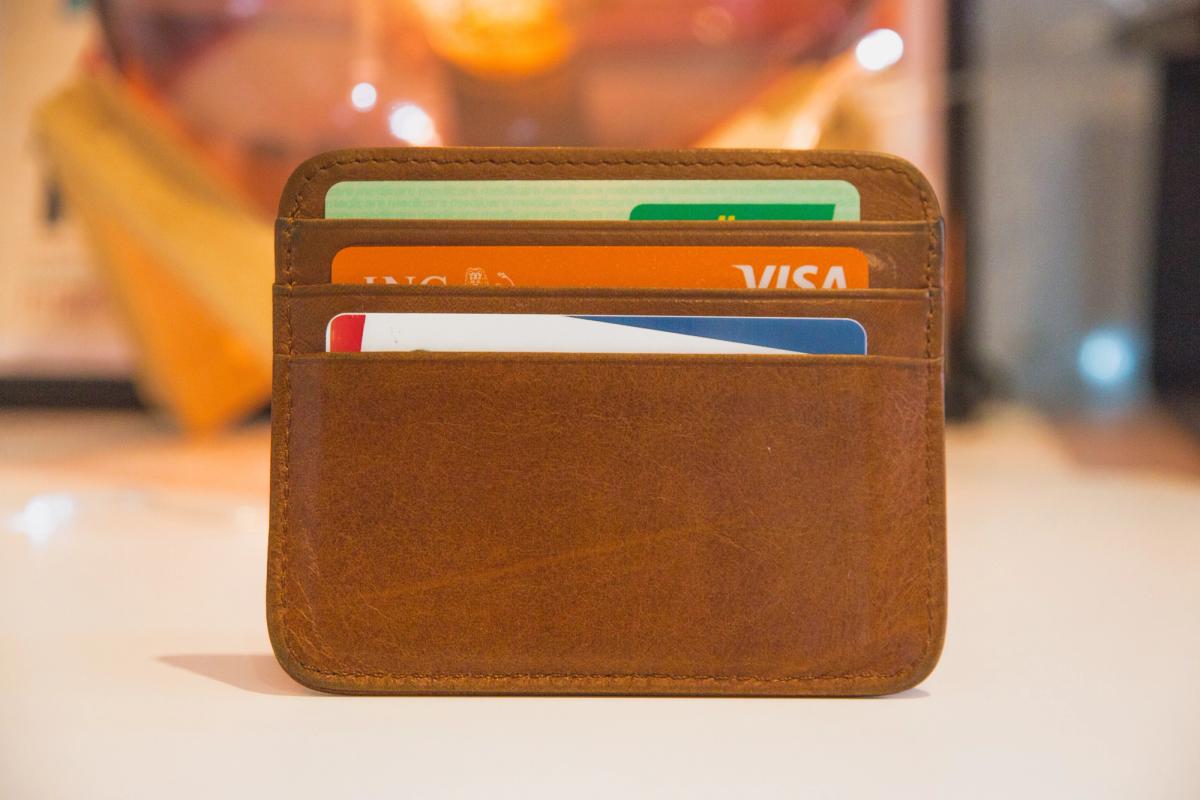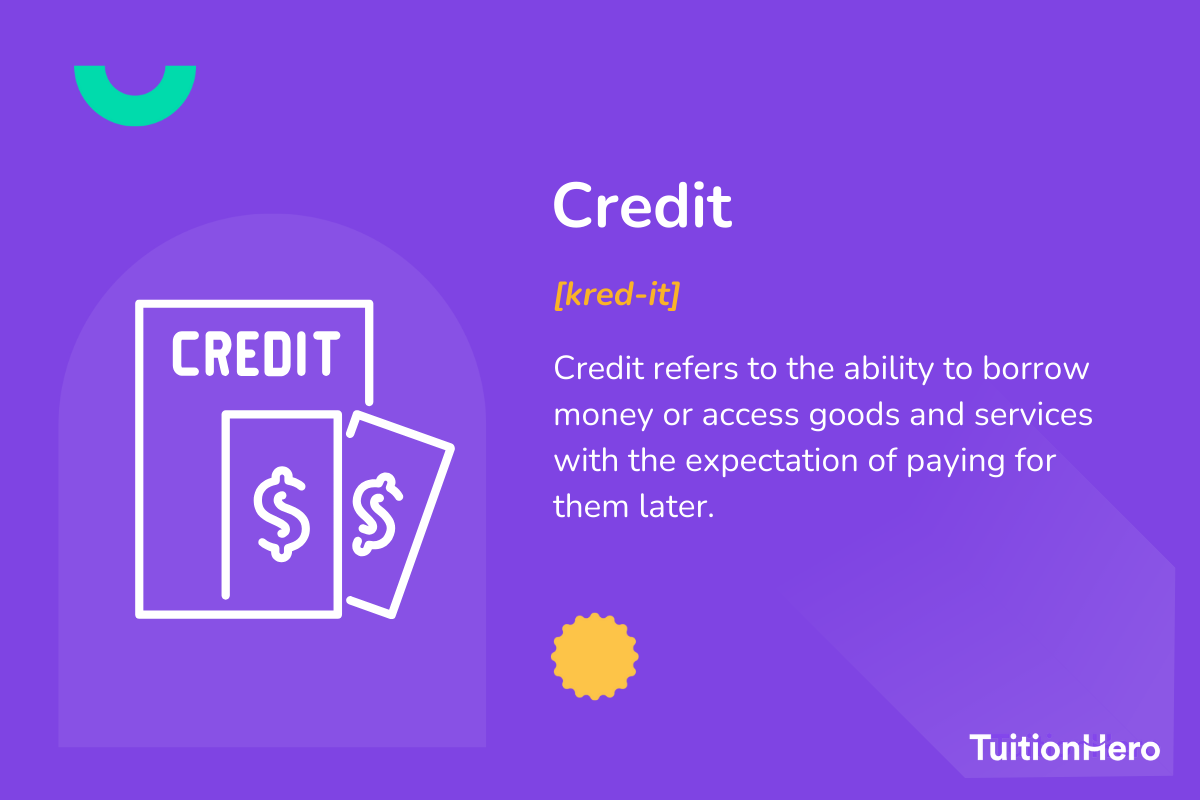Advertiser Disclosure
Last update: November 17, 2024
7 minutes read
What Is Credit? Beginner's Guide to Credit Scores and Reports
Learn all about what credit is with our comprehensive guide. From choosing the best credit card to maximizing rewards, get expert insights for smart financial decisions.

By Brian Flaherty, B.A. Economics
Edited by Rachel Lauren, B.A. in Business and Political Economy
Learn more about our editorial standards



By Brian Flaherty, B.A. Economics
Edited by Rachel Lauren, B.A. in Business and Political Economy
Learn more about our editorial standards
Ever found yourself scratching your head, wondering what everyone means by the word "credit", and wondered how it might affect you as a college student or a fresh graduate? Or maybe how it ties into those credit cards or student loans you might be considering? Well, let's dive deep and unravel this mystery!

Key takeaways
- Credit is a contractual agreement between a borrower and lender, often involving repayment with interest
- Your credit score plays a key role in determining your financial opportunities and potential interest rates
- Building credit early and responsibly can set you up for long-term financial success
What is credit?
What is credit? At its core, credit is a contractual agreement where a borrower receives something of value and commits to repaying the lender at a later date, often with some interest. Additionally, creditworthiness can represent how trustworthy a person or company is when it comes to managing and repaying borrowed funds.
Credit isn't just about borrowing money; it's about your financial reputation. It's a tool that, when used wisely, can open doors to opportunities like homeownership, entrepreneurship, and more.

Why should you care about credit?
You've probably heard your friends or maybe even your parents go on about the importance of "good credit." But let's be real here: why should a young person like you give a hoot about it? Well, because it's the key that unlocks some massive doors in life, like buying a car or getting your own apartment.
Good credit can also affect your ability to get a cell phone plan, utility services, or even lower insurance premiums. Landlords often check credit scores before renting apartments, so having good credit can give you more housing options.
How does your credit score affect your life?
Imagine wanting to buy that sleek new ride to impress on your first job interview - you have the down payment, but you still need a car loan. But, when you walk into the dealership, the salesman gives you the side-eye and says your credit score isn't looking too hot. Ouch!
This doesn’t only apply to buying cars but also homes, renovations, or even that cool new iPhone. Your credit score can affect the interest rates you get or if you even qualify in the first place.
How about jobs and relationships? Yeah, it matters there too. Some employers check credit scores to see how responsible you are.
And relationships? Money issues, including credit scores, are a top reason couples argue.
So, keep it healthy, not just for the banks but for love too! One woman even put her credit score in her profile on a dating app and reported getting hundreds of matches and comments!
Your credit score can range from 300 to 850, with higher scores indicating better creditworthiness. Scores are calculated based on factors like payment history, amounts owed, length of credit history, new credit, and types of credit used.
Dos and don'ts of credit
Before diving into the world of credit, it's essential to know the do’s and don'ts. Here's a quick table to guide you:
Do
Pay your balance in full every month
Review statements regularly
Set a monthly budget
Use rewards wisely
Don't
Spend more than you can afford
Open multiple cards simultaneously
Ignore interest rates
Make only minimum payments
What does “credit limit” mean?
A credit limit is the highest amount a lender, like a credit card issuer, is willing to let a borrower spend or owe. This usually applies to revolving debt or lines of credit, as opposed to a fixed loan.
When a borrower hits this threshold, they can't spend any more until they've paid down some of their debt. This concept doesn't just apply to credit cards but to lines of credit and "buy now, pay later" loans too.
Going over your credit limit can result in fees and hurt your credit score. It's important to stay below your limit to maintain a good credit utilization ratio.
What does “line of credit” mean?
A line of credit is a flexible loan offered by banks or financial institutions, allowing borrowers to access funds up to a set limit when they need to, rather than borrowing the full amount upfront.

TuitionHero Tip
An example is the home equity line of credit (HELOC), where homeowners can borrow against their property's value for projects like home improvements.
What are the different types of credit?
Credit isn't just a one-size-fits-all deal. It comes in a few flavors.
- Revolving credit: This is your typical credit card scenario. You get a limit, and you can spend up to that amount. You'll either pay it off in full or carry some of that balance over to the next month. It's like having a monthly subscription to money, but remember, it's not free!
- Installment credit: Think of your student loans or maybe a car loan. You borrow a chunk of money and then pay it back in bits over time. It's like layaway but in reverse.
- Service credit: This one's a little different. It's like when you binge-watch an entire season of that new show and then get the bill at the end of the month. Your cell phone, electricity, and that gym you swear you'll start using next week fall into this category.
- Open credit: This type of credit requires full payment each period, like utility bills or charge cards that must be paid in full each month.
So, how can you make credit work for you?
Let's face it, understanding credit is a good idea, but how can you make it work for you? You might be thinking, "I'm just a student, how can I start building credit?" or "I've messed up, can I rebuild my credit?"
The answer is, "Of course, you can!" And here's how:
- Start small: If you're new to the credit game, start by becoming an authorized user on a trusted family member's account. You get the benefits, without the liability of paying. But be careful, if they don’t make their payments, it can hurt your credit too.
- Secured cards: If you've got a rocky credit past or you're just starting out, consider a secured card. It's like training wheels for credit. The way it works is you put down a deposit (say, $500) on a credit card, which you can spend against to build your credit score, as opposed to just spending that money in cash or on a debit card.
- Keep an eye on your score: Remember those report cards in school? Credit scores are the grown-up version. Always aim for the A range, which is around 740 or higher.
- Pay bills on time: Your payment history is a significant factor in your credit score.
- Diversify your credit mix: Different types of credit (like a credit card and a student loan) can help boost your score.
- Limit hard inquiries: Applying for multiple credit accounts in a short period of time can lower your score.
- Regularly check your credit reports: Get free reports from the three major credit bureaus (Equifax, Experian, and TransUnion) to ensure accuracy.
Compare private student loans now
TuitionHero simplifies your student loan decision, with multiple top loans side-by-side.
Compare Rates
Advantages and disadvantages of using credit while in college
Navigating college life can be challenging, especially when juggling studies, work, and personal finances. Credit cards often become a go-to for many students, offering a mix of benefits and pitfalls. Let's break down the pros and cons of wielding that piece of plastic during your college years.
- Building credit early: Start now, and by graduation, you could have a solid credit history.
- Emergency funds: For unexpected expenses, like that textbook you forgot to buy or last-minute travel.
- Rewards and perks: Many cards offer cash back, travel rewards, or discounts on dining and entertainment.
- Learning money management: A hands-on way to understand budgeting, spending, and financial responsibility.
- Debt accumulation: It's easy to spend more than you can repay, leading to growing balances.
- Interest rates: Miss a payment or just pay the minimum, and those interest charges can stack up.
- Impact on credit score: Irresponsible usage can hurt your credit score, affecting future financial opportunities.
- Potential for impulse purchases: Let's face it, with easy access to funds, impulsive buys can become a habit.

Why trust TuitionHero
Navigating student loans, refinancing, and scholarships can be overwhelming, which is why we created TuitionHero. We guide you through managing college finances, including loans, scholarships, credit card offers, and FAFSA assistance. Our goal is to empower you with the knowledge and resources needed to make informed decisions.
Frequently asked questions (FAQ)
A credit score is a numerical representation of your creditworthiness, ranging from 300 to 850. It's calculated based on factors like payment history, amounts owed, length of credit history, new credit, and types of credit used.
You can check your credit score through various online services, some of which are free. Additionally, you're entitled to a free credit report annually from each of the three major credit bureaus at AnnualCreditReport.com.
If you find an error, contact the credit bureau reporting the mistake to dispute it. Provide documentation to support your claim. Correcting errors can improve your credit score.
Most negative information, like late payments or defaults, stays on your credit report for seven years. Bankruptcies can remain for up to ten years.
Final thoughts
So, with all this talk about credit, financial responsibilities, and making those smart money moves, wouldn't you want a trusted companion on this journey? That's us. At TuitionHero, we're committed to making your college financial journey not just bearable, but successful.
Source
Author

Brian Flaherty
Brian is a graduate of the University of Virginia where he earned a B.A. in Economics. After graduation, Brian spent four years working at a wealth management firm advising high-net-worth investors and institutions. During his time there, he passed the rigorous Series 65 exam and rose to a high-level strategy position.
Editor

Rachel Lauren
Rachel Lauren is the co-founder and COO of Debbie, a tech startup that offers an app to help people pay off their credit card debt for good through rewards and behavioral psychology. She was previously a venture capital investor at BDMI, as well as an equity research analyst at Credit Suisse.
At TuitionHero, we're not just passionate about our work - we take immense pride in it. Our dedicated team of writers diligently follows strict editorial standards, ensuring that every piece of content we publish is accurate, current, and highly valuable. We don't just strive for quality; we aim for excellence.
Related posts
While you're at it, here are some other college finance-related blog posts you might be interested in.
Shop and compare student financing options - 100% free!

Always free, always fast
TuitionHero is 100% free to use. Here, you can instantly view and compare multiple top lenders side-by-side.

Won’t affect credit score
Don’t worry – checking your rates with TuitionHero never impacts your credit score!

Safe and secure
We take your information's security seriously. We apply industry best practices to ensure your data is safe.
Finished scrolling? Start saving & find your private student loan rate today





